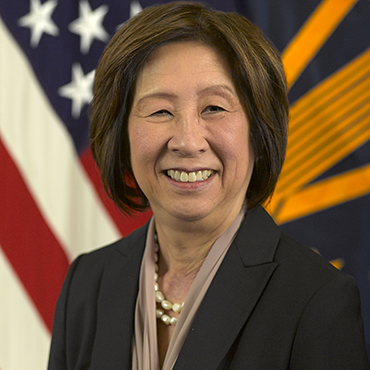Is DOD foot-dragging on spectrum sharing?
CIO Teri Takai takes heat on the Hill from lawmakers who want the process of releasing radio spectrum to industry to move faster.

Defense CIO Teri Takai took heat on the Hill over the speed of spectrum sharing plans. (File photo)
House members on both sides of the aisle are clearly frustrated at the Defense Department's pace in coming up with ways to clear or share radio spectrum coveted by industry for wireless broadband. At a June 27 hearing, Defense Department CIO Teri Takai took some heat from members who think the government, and DOD in particular, is slow-walking the process.
"We're serious about trying to compress this timeline and get answers," said Rep. Greg Walden (R-Ore.), chairman of the Energy and Commerce Committee's subcommittee on Communications and Technology.
The Obama administration pledged to make 500 MHz of spectrum available to expand wireless broadband services as part of its 2010 National Broadband Plan, with spectrum coming from shifting some existing commercial and government users. Since 2004, the National Telecommunications and Information Administration (NTIA), the Commerce Department office that manages federal spectrum holdings, has been charged with expanding commercial access to spectrum. Industry has its sights set on the 1755-1780 MHz band, which is used internationally for wireless services.
Currently DOD uses the spectrum for air combat training, unmanned aerial vehicles or drones, precision guided munitions, satellite communications and more. There 'is growing urgency on the part of industry to make this swath of spectrum available, because it pairs well with the 2155-2180 MHz band, which the Federal Communications Commission is required to auction off by February 2015.
Takai listed a number of challenges that have prevented the military from committing to a specific plan of spectrum relocation. She said that moving the air combat training system into a more compressed patch of spectrum would limit the number of training missions that could be flown simultaneously, thus slowing down the rate of deployment of trained military pilots. More generally, Takai suggested that budget issues are playing a role in the pace of change. Because there are functional systems in place, she said, "we have not necessarily been able to put the dollars into putting new innovative technologies into those systems in order to do some of these things."
Rep. Anna Eshoo (D-Calif.) said that Congress was going to need to develop incentives for agencies who are being asked to relinquish or share spectrum, but she also lashed out at the pace of the progress. "The same old-same old that prevailed for years simply is not going to be accepted around here," she said. "This is as serious as it gets. We really want to see some movement and some action in the right places."
The Defense Department is still firmly in study mode, however. In her prepared testimony, Takai said that DOD is looking to get past the problem of sharing information with the Commerce Spectrum Management Advisory Committee, which includes representatives from industry. The Pentagon has come up with a non-disclosure agreement for sharing controlled unclassified information, and is waiting for industry to sign. And officials have taken steps to evaluate the possibility of sharing spectrum with industry, including "allowing the wireless providers on selected DOD sites to monitor the spectrum, as well as modeling, simulation and analysis to develop an understanding of the sharing environment," Takai said.
According to Chris Guttman-McCabe, executive vice president of CTIA, a trade association representing the wireless industry, there is space for the military to relocate. "It looks like each of these services has a band they could go into – a band that is already a government utilized band," he said. His findings are contained in an industry "Road Map" filed with the FCC and the CPMAC.
At the hearing, Guttman-McCabe shared a copy of the report with Takai, prompting Rep. Anna Eshoo (D-Calif.) to joke: "Just in that exchange, maybe six months were saved."
According to Takai, the Defense Department is taking this issue very seriously, with 50 full time staffers working on spectrum. But she said that without direction on whether they're going to be asked to compress current operations into new spectrum or share spectrum, the Defense Department could no't offer a timeline of moving out of the spectrum coveted by industry.
Going forward, DOD officials will have the opportunity to detail their progress at more-frequent intervals. Rep. Henry Waxman (D-Calif.), ranking member of the full Energy and Commerce Committee, announced that he and committee Chairman Fred Upton (R-Mich.) have asked for monthly meetings with the DOD, NTIA and the FCC. "We're not making progress fast enough," Waxman said. "The agencies seem to be pointing fingers at each other in justifying why they're not acting in accordance with the president's directives to free up the federal spectrum."






